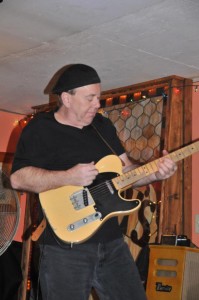 Chris Stovall Brown can talk endlessly about his guitars and gear. He went into some detail about his axe, amps, pickups, and pedals. The life long Boston blues guitarist is considered a minimalist. Many guitarists use their pedals rather than their amps to give them the sound they’re looking for. Brown gets by more on amps and he uses a limited amount of gear.
Chris Stovall Brown can talk endlessly about his guitars and gear. He went into some detail about his axe, amps, pickups, and pedals. The life long Boston blues guitarist is considered a minimalist. Many guitarists use their pedals rather than their amps to give them the sound they’re looking for. Brown gets by more on amps and he uses a limited amount of gear.
Telecasters are his guitar of choice. “Leo got it right the first time,” he said. “I started with Telecasters. I played Strats for 18 years, and I came back home. It’s a working man’s guitar. Occasionally, I’m a working man. I can get anything I want out of it. I suits my purposes to a T.”
Brown does not have a guitar from a favorite year. He’s switched guitars so many times that they’re interchangeable. He currently owns two Telecasters, a 2008 Fender road worn Telecaster that he has changed the pickups on it to a Bill Lawrence Keystone pickups. Lawrence is one of the main pickup innovators over the last 50 years. Lawrence wound pickups for Jeff Beck in the Yardbirds back in the late 1960s.
“His pickups are about as cheap as you can buy, and I love the sound of them,” Brown said. “It gives me the sound I’m looking for.
Brown also owns what is called a Fender partscaster, a guitar made of all different parts put together. The body is a 1985 Tokai, which is a Japanese manufacturer. Stovall has a Hipshot Trilogy bridge which allows him to do re-tunings on the fly. The partscaster also has the Bill Lawrence pickups.
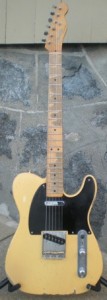 When Brown hears a sound in his head he wants to arrive at, he changes things around on his axe until he gets his it to make that sound. It can take a long time to find the right sound. “Every little piece of equipment that you put into the equation can vary your sound, up to and including your guitar cables,” Brown said. The guitarist has been using for 20 years cords also invented by Bill Lawrence.
When Brown hears a sound in his head he wants to arrive at, he changes things around on his axe until he gets his it to make that sound. It can take a long time to find the right sound. “Every little piece of equipment that you put into the equation can vary your sound, up to and including your guitar cables,” Brown said. The guitarist has been using for 20 years cords also invented by Bill Lawrence.
“Bill Lawrence came from Germany,” Brown said. “He was one of the first people to start making what they call after-market pickups. He had a partner, and the partner ran him ragged. He couldn’t use his own name for a number of years. He just recently won a lawsuit to use his name again as a trademark. With the exception of a guy named Seth Lover who invented the Humbucking pickups that you find typically on Gibsons, Bill Lawrence holds the most patents for pickup innovations.”
Brown has taken on the task of cutting through Lawrence’s thick German accent and found “he can talk circles around anybody in terms of technological knowledge, and not just from a musical standpoint,” Brown said. “I had a problem with one of his pickups and he wanted me to play it over the phone. He sat there and listened to it over the phone. He thought it was one thing, and he had me overnight it back to him, and he called me 30 hours later and told me it was the first new innovation in pickups for him in 33 years. Basically, what had happened was by a fluke of circumstance my pickup had been wound to a particular frequency that the U.S. Navy broadcasts to the submarines on. Then he calculated the odds and it was somewhere in the millions of coming up with that exact combination, and then he verified the results with his son who was a communications guy with the Marines.”
Lawrence got Brown’s cell phone number and he’d ask Brown to leave the phone on during a set so he could listen to Brown’s tone. Lawrence also deduced Jimi Hendrix’s sound down to Hendrix using old curly cords. Because of the amount of capacitance in them, that contributed to why he was able to get his particular sound. “He would go off on many other tangents about Hendrix cause he knew all of these guys and had done work with them,” Brown said.
Brown reported that Lawrence now makes boutique after market pickups that will sell for one to five hundred dollars a set. He also related that a lot of people today who are revered for their pickups had originally learned from Lawrence. Lawrence even repairs pickups for free, even though he doesn’t advertise that.
Brown is also a big fan of amps. He uses two. His regular amp is a 1963 Gibson maestro stereo amp. There are only four of those amps in existence. There were 1138 that were made from 1959 to 1967 but there were only four of the maestro, and three of them currently reside in Massachusetts. Brown also had a 1965 Gibson Stereo Amp which was stolen from him. “If I’m playing in an auditorium or a gymnasium, then I have an amp that was built by a friend of mine,” he said. “It’s all hand made. It’s a copy of a 55’ Fender tweed pro.”
Brown has an endorsement deal with GHS strings and gets all his strings from them. The guitarist uses chrome dome slides made by a company called Latch Lake. He has about 30 slides in his collection. He also uses Dunlop L3 Jazz picks. He uses the sides of those and he’s only had two break in 25 years.
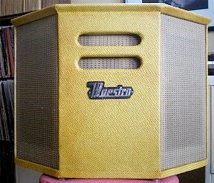 Pedals is another thing Brown likes to chat about. He’s currently awaiting a new pedal from the up and coming pedal company in Hudson, Massachusetts called Celestial Effects. Celestial Effects will be sending him a prototype of a pedal design he suggested to their chief engineer. Called the Gemini, it will have a tremolo unit, a vibrato, and a reverb all built into one. “I said ‘You want a good idea for something that will sell? Instead of making another boost pedal, why don’t you make a true vibrato pedal and put tremolo in it and be able to combine the effects.’”
Pedals is another thing Brown likes to chat about. He’s currently awaiting a new pedal from the up and coming pedal company in Hudson, Massachusetts called Celestial Effects. Celestial Effects will be sending him a prototype of a pedal design he suggested to their chief engineer. Called the Gemini, it will have a tremolo unit, a vibrato, and a reverb all built into one. “I said ‘You want a good idea for something that will sell? Instead of making another boost pedal, why don’t you make a true vibrato pedal and put tremolo in it and be able to combine the effects.’”
Brown’s other, consistent, pedal is Analog Man made in Connecticut. At almost every one of his shows, Brown uses the Analog Man Bi Comp-Rosser. “That’s basically two compressor pedals built into one,” he said. “When I use that, I will have one of the compressors on at all times. I’ll use the other compressor as a clean boost.” Compressors even out your sounds so thinner stings have a fatter sound and your thicker strings don’t sound quite as fat. It also balances the volume somewhat.
A minimalist, Brown uses a smaller pedal board than most others. He only brings a board with just a pedal, a compressor, a tuner, a digital clock, a looper, and a vibrato-tremolo pedal.
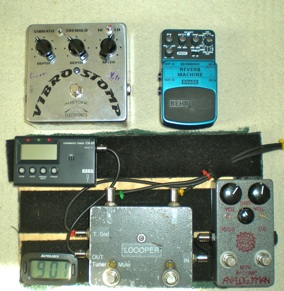 For his harps Brown prefers James Gordon Customized Marine Band Harmonicas. They cost $120 a piece if you can get Gordon to make one for you. “They’re the best available, consistency in product,” Brown said. “James Gordon lives in Vermont. Unfortunately he has MS so he can only work three or four hours at the bench. He has a long waiting list for people.” Neil Young is one of Gordon’s clients.
For his harps Brown prefers James Gordon Customized Marine Band Harmonicas. They cost $120 a piece if you can get Gordon to make one for you. “They’re the best available, consistency in product,” Brown said. “James Gordon lives in Vermont. Unfortunately he has MS so he can only work three or four hours at the bench. He has a long waiting list for people.” Neil Young is one of Gordon’s clients.
Brown’s harp microphone is an early 1960s Astatic JT-30. “They were dispatch mics made for taxi cab companies. They were a cheap mic. Nowadays, they’re ridiculously expensive. I use crystal cartridges in those. There’s two different kinds. There’s a ceramic and there’s a crystal. They both have different sounds.” Brown reports that the cartridges are now made in Mexico and have been reduced from the size of a silver dollar to a quarter. “They don’t sound the same. When this one goes, I don’t know what I’ll do because I used to have a box of them,” he said.
For a vocal microphone Brown prefers a Shure SM-58. He said his microphone “makes me louder than people can stand,” he quipped. “It’s 25 years old. It’s still kicking and taking a licking, and should I ever find myself in another bar fight, and they get through the Telecaster, then the SM-58 will provide a ready back up.”
Brown, though many don’t know it, is also a drummer. He toured as a drummer for two years with Watermelon Slim whom he produced two albums for. Brown uses a 1965 Ludwig Club date with blue sparkle, a 1970s Rogers Power Tone Snare, and Zildgin A cymbals. Brown doesn’t usually play drums for a whole night. But, the first week of last March he did play drums for Shirley Lewis.
“You can go on YouTube and find about a hundred videos of me playing all over the world as a drummer,” Brown said. When told it’s not commonly known that he’s a drummer, Brown said “Most of the drummers around here don’t want you to know that.” He laughed.
Brown continues a full schedule in the Boston area blues scene. Serious guitar fans can check him out and talk to him about his guitar tone. He’ll never run out of things to say.
Chris Stovall Brown is available on Facebook.

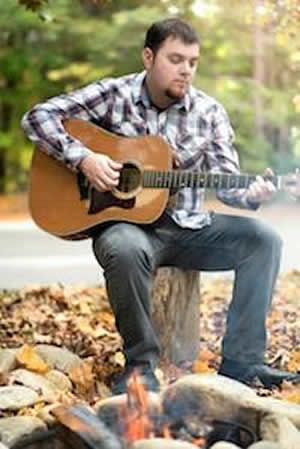
Hi
do you ever read these things after you put them online? in one article i find out about brown using “his it to make that sound”. Really…my it won’t make any noise at all.
it’s also good to know there is “an up and pedal company in Hudson…cant get enough locally built up and pedals.
a good exterminator can help you with those nasty humbugs….
you play a CHORD…you plug in with a CORD….
always enjoy your writting, bill. laughter IS after all, the best medicine.
best
ND
[…] post: Boston blues guitarist Chris Stovall Brown love his gear Share this post to your […]